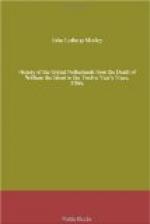Alexander Farnese was equally plain-spoken to a sovereign with whom plain-speaking was a crime. In bold, almost scornful language, the Prince represented to Philip the sufferings and destitution of the little band of heroes, by whom that magnificent military enterprise, the conquest of Antwerp, had just been effected. “God will be weary of working miracles for us,” he cried, “and nothing but miracles can save the troops from starving.” There was no question of paying them their wages, there was no pretence at keeping them reasonably provided with lodging and clothing, but he asserted the undeniable proposition that they “could not pass their lives without eating,” and he implored his sovereign to send at least money enough to buy the soldiers shoes. To go foodless and barefoot without complaining, on the frozen swamps of Flanders, in January, was more than was to be expected from Spaniards and Italians. The country itself was eaten bare. The obedient Provinces had reaped absolute ruin as the reward of their obedience. Bruges, Ghent, and the other cities of Brabant and Flanders, once so opulent and powerful, had become mere dens of thieves and paupers. Agriculture, commerce, manufactures—all were dead. The condition of Antwerp was most tragical. The city, which had been so recently the commercial centre of the earth, was reduced to absolute beggary. Its world-wide traffic was abruptly terminated, for the mouth of its great river was controlled by Flushing, and Flushing was in the firm grasp of Sir Philip Sidney, as governor for the English Queen. Merchants and bankers, who had lately been possessed of enormous resources, were stripped of all. Such of the industrial classes as could leave the place had wandered away to Holland and England. There was no industry possible, for there was no market for the products of industry. Antwerp was hemmed in by the enemy on every side, surrounded by royal troops in a condition of open mutiny, cut off from the ocean, deprived of daily bread, and yet obliged to contribute out of its poverty to the maintenance of the Spanish soldiers, who were there for its destruction. Its burghers, compelled to furnish four hundred thousand florins, as the price of their capitulation, and at least six hundred thousand more for the repairs of the dykes, the destruction of which, too long deferred, had only spread desolation over the country without saving the city, and over and above all forced to rebuild, at their own expense, that fatal citadel, by which their liberty and lives were to be perpetually endangered, might now regret at leisure that they had not been as stedfast during their siege as had been the heroic inhabitants of Leyden in their time of trial, twelve years before. Obedient Antwerp was, in truth, most forlorn. But there was one consolation for her and for Philip, one bright spot in the else universal gloom. The ecclesiastics assured Parma, that, notwithstanding the frightful diminution in the population of the city, they had confessed and absolved more persons that Easter than they had ever done since the commencement of the revolt. Great was Philip’s joy in consequence. “You cannot imagine my satisfaction,” he wrote, “at the news you give me concerning last Easter.”




